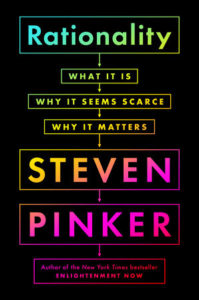
Rationality: What It Is, Why It Seems Scarce, Why It Matters
By Steven Pinker
432 pages
Published Sept. 28, 2021 by Viking
His name kept coming up in conversations. Good conversations.
“I’ve never read him,” I admitted.
I’d get that “Are-you-kidding-me?” look.
I googled.
Turns out that Steven Pinker is a professor of psychology at Harvard University. He’s also a member of the National Academy of Sciences and a two-time Pulitzer Prize finalist. He was named one of Time’s 100 Most Influential People, and one of Foreign Policy’s 100 Leading Global Thinkers.
His books include The Blank Slate, The Stuff of Thought, The Better Angels of Our Nature, The Sense of Style, Enlightenment Now, and Rationality. I started with the newest one, the full title of which is Rationality: What It Is, Why It Seems Scarce, Why It Matters.
Given Pinker’s impressive intellectual credentials, I was prepared for a tough read. But the book begins quite gently, with a review of some of the better-known probability puzzles.
Like this one (known as “The Monty Hall Problem”):
A contestant is faced with three doors. Behind one of them is a sleek new car. Behind the other two are goats. The contestant picks a door – say, Door #1. To build suspense, Monty opens one of the other two doors – say, Door #3 – revealing a goat. To build the suspense still further, he gives the contestant an opportunity either to stick with the original choice or switch to the unopened door. You are the contestant. What should you do?
Correct answer: You should open another door. It’s a game show, silly. It’s designed to keep up the suspense.
And this one:
Linda is 31 years old, single, outspoken, and very bright. She majored in philosophy. As a student, she was deeply concerned with issues of discrimination and social justice, and also participated in anti-nuclear demonstrations. Which is more probable? 1, Linda is a bank teller. Or, 2, Linda is a bank teller and is active in the feminist movement.
Correct answer: She is a bank teller. (Most people pick 2, even though it’s mathematically impossible for it to be more probable.)
I was pretty sure I knew the “rational” answers to all of the puzzles, since I’d encountered them before. Instead, either because I’d forgotten or because I’d never double-checked my answers, I was wrong about every one.
Pinker’s explanations of the correct answers were lucid and enlightening and fun. After that, I was all in. And to my delight, he then took his talent for connecting reason to common sense and applied it to all sorts of contemporary issues, including Critical Race Theory and other intellectual constructs of Woke Culture.
I haven’t finished the book yet, but here are some examples of what I’ve found so far that I thought not just smart but brave:
In 2020 the brutal murder of George Floyd, an unarmed African-American man, by a white police officer led to massive protests and the sudden adoption of a radical academic doctrine, Critical Race Theory, by universities, newspapers, and corporations. These upheavals were driven by the impression that African-Americans are at serious risk of being killed by the police. Yet as with terrorism and school shootings, the numbers are surprising. A total of 65 unarmed Americans of all races are killed by the police in an average year, of which 23 are African-American, which is around three-tenths of one percent of the 7,500 African-American homicide victims.
….
A second sphere in which we cannot rationally forbid base rates is the understanding of social phenomena. If the sex ratio in a professional field is not 50-50, does that prove its gatekeepers are trying to keep women out, or might there be a difference in the base rate of women trying to get in? If mortgage lenders turn down minority applicants at higher rates, are they racist, or might they… be using base rates for defaulting from different neighborhoods that just happen to correlate with race?
A recurring theme of Rationality is that when it comes to difficult conversations, facts must be the common material, and logic must be the guiding rule. Unfortunately, Pinker says, these core elements of rationality have been all but abandoned at most US universities.
A major reason for the mistrust is the universities’ suffocating left-wing monoculture, with its punishment of students and professors who question dogmas on gender, race, culture, genetics, colonialism, and sexual identity and orientation. Universities have turned themselves into laughingstocks for their assaults on common sense.
Reasoned argument, Pinker asserts, has been replaced by sophistry riddled with the most basic logical fallacies.
* Ad hominem: “You don’t know because you are a privileged white man.”
* Genetic: “I can’t believe you because your facts came from Fox News.”
* Affective: “What you are saying is wrong because it hurts my feelings.”
Sometimes, Pinker says, the ad hominem and genetic fallacies are combined to forge chains of guilt by association. He gives this example: “Williams’ theory must be repudiated because he spoke at a conference organized by someone who published a volume containing a chapter written by someone who said something racist.”
As I said, I haven’t finished the book – but so far, I’m liking it. It’s engaging. It’s knowledgeable. And it makes sense.
Actually, I’m amazed that this book was published in the first place and that Pinker is still holding a job.
Critical Reception
* “An impassioned and zippy introduction to the tools of rational thought…. Punchy, funny, and invigorating.” (The [London] Times)
* “Pinker competes with venerable thinkers like Noam Chomsky, Jared Diamond, Charles Murray, Thomas Sowell, Francis Fukuyama, and so forth for the mythical title of America’s Top Public Intellectual.” (Steve Sailor in Taki’s Magazine)
“Erudite, lucid, funny, and dense with fascinating material.” (The Washington Post)


